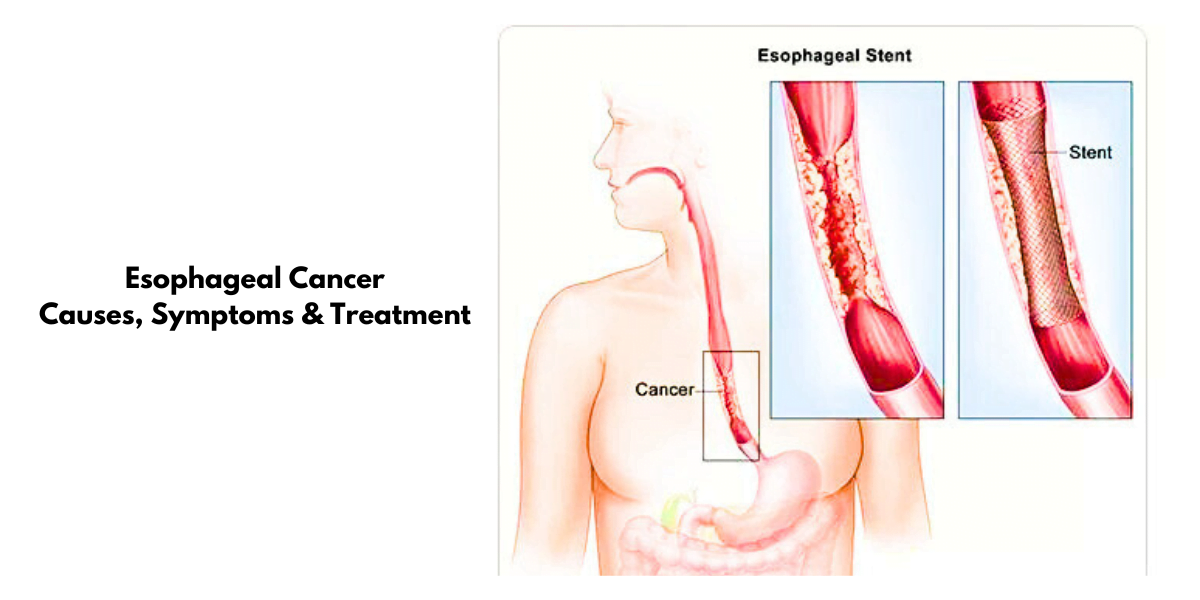BLOG
Esophageal Cancer: Causes, Symptoms and Treatment Options

Esophageal cancer is a serious disease that starts in the tissues of the esophagus — the muscular tube that moves food from the mouth to the stomach. Despite being less common than other types of cancer, esophageal cancer is often aggressive and can be challenging to treat. Understanding the causes, recognizing the symptoms early, and knowing the treatment options can significantly impact the outcomes for those affected.
Causes of Esophageal Cancer
The exact cause of esophageal cancer isn't known, but several factors are known to increase the risk of developing it. These include:
Tobacco and Alcohol Use: Smoking or using tobacco products significantly increases your risk. Additionally, heavy alcohol consumption is also linked to higher rates of esophageal cancer, especially when combined with smoking.
Acid Reflux: Chronic gastroesophageal reflux disease (GERD) can lead to changes in the lower esophagus. Over time, GERD can cause a condition known as Barrett's esophagus, a precursor to cancer.
Diet: A diet low in fruits and vegetables and certain preservation techniques like pickling can increase esophageal cancer risk.
Obesity: Being overweight increases the risk of developing many forms of cancer, including esophageal cancer, often due to increased rates of GERD in obese individuals.
Age and Gender: Esophageal cancer is more commonly diagnosed in people over the age of 55 and is more prevalent in men than in women.
Genetic Factors: While not as strong a factor as lifestyle, genetic predispositions can also play a role, especially in families with a history of the disease.
Symptoms of Esophageal Cancer
Esophageal cancer symptoms often appear once the disease is advanced, which can make early detection difficult. Common symptoms include:
- Difficulty Swallowing (Dysphagia): Initially, this might occur only with solid foods, but as the tumor grows, even liquids can become difficult to swallow.
- Weight Loss: This can be due to eating less because of swallowing difficulties or a general decrease in appetite.
- Chest Pain or Discomfort: Particularly behind the breastbone or in the middle part of the abdomen.
- Persistent Cough or Hoarseness: Caused by the tumor affecting the throat and nearby regions.
- Indigestion or Heartburn: Which can also be symptoms of more common, less serious conditions.
Diagnostic Procedures
Diagnosis of esophageal cancer typically involves a combination of endoscopic examinations and imaging studies. An endoscopy allows doctors to view the inside of the esophagus and collect tissue samples (biopsy) for analysis. Imaging tests like CT scans, PET scans, and X-rays help determine the extent (stage) of the cancer.
Treatment Options for Esophageal Cancer
Treatment depends largely on the stage of the cancer, the patient's overall health, and whether the cancer is considered resectable (able to be removed with surgery) or unresectable. Common treatment options include:
Surgery
Surgical removal of the tumor is the best option when the cancer is localized. This might involve removing part or all of the esophagus and nearby lymph nodes.
Radiation and Chemotherapy
For patients who cannot undergo surgery, or in combination with surgery, radiation and chemotherapy can be effective. Radiation therapy uses high-energy rays to target and kill cancer cells, often in conjunction with chemotherapy, which uses drugs to kill cancer cells throughout the body.
Targeted Therapy
This involves drugs or other substances that specifically target cancer cells without harming normal cells. For example, therapies that target the HER2 protein may be used in certain types of esophageal cancer.
Immunotherapy
Immunotherapy boosts the body’s natural defenses to fight the cancer. It's a newer area of cancer treatment and can be an option for cases where other treatments haven’t worked.
Best Medicine Use
The choice of medication depends on the type and stage of esophageal cancer. For instance, chemotherapeutic agents such as fluorouracil, cisplatin, and docetaxel are commonly used. Targeted therapy drugs like trastuzumab are used for HER2-positive esophageal cancers. Recently, immunotherapy drugs like pembrolizumab have shown promise in treating advanced esophageal cancer, especially in patients whose tumors express PD-L1.
Conclusion
Esophageal cancer, though challenging, can be managed effectively with early detection and a combination of treatments tailored to the patient’s specific condition. Advances in medical science are continually improving the outcomes for patients, with new treatments and drugs being developed to extend life and improve its quality. Awareness of the risk factors and symptoms can lead to early diagnosis, which is crucial for effective treatment and better survival rates. As always, maintaining a healthy lifestyle can help reduce the risk of developing this serious disease.More

